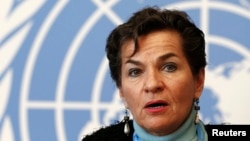Negotiators drafting a climate change agreement have doubled the size of the text they began with. Some of the nearly 200 delegates who attended the weeklong session are concerned that the expanded text may complicate efforts to combat global warming.
The delegates began this round of talks with the aim of streamlining the 39-page text. Instead, the draft of this climate change agreement has ballooned to 86 pages.
Ilze Pruse, the head of the Latvian delegation to the European Union who actively pushed for a pruned-down version of the text, put a brave face on the results.
"We are happy that it is owned by and reflects the views of parties," she said. "It will be a guide for our negotiations in the coming months and in this respect, I think we can consider Geneva as an important step forward. …
"We have to move forward in a practical and collaborative way involving all parties as well as a broad range of other stakeholders. We are all working for the same end — an international, legally binding global climate agreement applicable to all parties that keeps us on track to our below-2-degrees target and helps us to avoid dangerous climate change.”
For this to be achieved, scientists say nations must cut greenhouse gas emissions to less than 2 degrees Celsius above preindustrial warming. But time is running out. In just 10 months, world leaders will gather in Paris to sign a climate change agreement. The road ahead is bound to prove rocky.
An end-of-March deadline has been set for governments to declare their targets for reducing greenhouse gas emissions. The next round of negotiations is scheduled for June in Bonn.
Elina Bardram, head of the European Commission delegation, put a diplomatic spin on the week’s events, saying the negotiators had laid down some good ground for further work this year. Despite this, she was barely able to contain her disappointment.
She said the proceedings gave delegates little opportunity to talk about the many changes needed to tackle global warming. She said time was wasted and opportunities lost for making progress.
“Between now and June, we do hope that there will be a very clear view between and among the parties about the working method, about how we are going to speed up things and how we are going to be able to also identify what actually belongs into the core agreement. … So we need to really start working on the substance of the agreement,” Bardram said.
The substance of the agreement essentially focuses on the lifestyle changes that will have to be made to make life on Earth sustainable.
Scientists warn that continued global warming will uproot millions of people from low-lying islands as sea levels rise. They predict serious consequences will accrue as a result of more frequent, extreme weather events, including food and water shortages, health problems and growing conflicts as people fight over dwindling resources.




